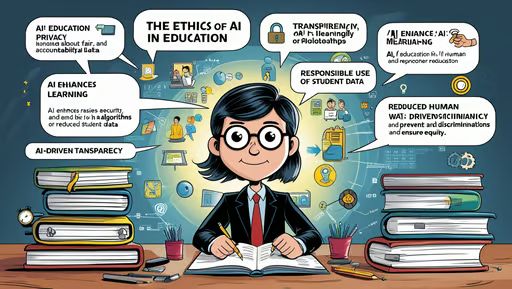Ethical Considerations in AI-Powered Educational Tools

The integration of artificial intelligence into education has created unprecedented opportunities for personalized learning and academic support. Tools like the AI Homework Helper have transformed how students approach their studies, offering guidance, explanations, and resources tailored to individual needs. However, as these technologies become increasingly embedded in educational practices, important ethical considerations demand our attention. The responsible development and implementation of AI educational tools require careful navigation of several complex ethical dimensions.
Data Privacy and Student Information
AI-powered educational tools function by collecting and analyzing vast amounts of student data—from basic demographic information to detailed learning patterns, response times, common errors, and even emotional states during learning activities. This data collection raises significant privacy concerns that must be addressed through robust policies and technical safeguards.
Educational institutions and technology developers have a responsibility to implement strict data protection measures, including encryption, anonymization where appropriate, and clear limitations on data retention and usage. Furthermore, transparent communication about what data is collected, how it is used, and who has access to it is essential for maintaining trust with students, parents, and educators.
The unique vulnerability of minors in educational settings adds another layer of ethical complexity. Unlike adult users who may consent to data collection, young students may not fully understand the implications of digital tracking. This reality places additional responsibility on schools and developers to serve as ethical stewards of student information.
Algorithmic Bias and Educational Equity
AI systems are only as unbiased as the data used to train them and the algorithms that process this information. Educational AI tools may inadvertently perpetuate or amplify existing biases if their development does not explicitly address issues of fairness and representation.
For example, if an AI homework helper is primarily trained on data from students with certain demographic characteristics or learning styles, it may be less effective for students from different backgrounds or with alternative approaches to learning. Similarly, language processing capabilities might favor students who use mainstream dialects or expressions, potentially disadvantaging those who speak regional varieties or non-native forms of the language.
Addressing these concerns requires diverse development teams, representative training data, regular bias audits, and ongoing monitoring of system performance across different student populations. The goal must be to create educational AI that serves as an equalizing force rather than one that reinforces existing educational disparities.
Autonomy and Critical Thinking
A central tension in AI-supported education involves balancing helpful guidance with the development of student autonomy and critical thinking. When AI systems provide too much assistance or offer answers without requiring intellectual engagement, they risk undermining the very learning processes they aim to support.
Effective educational AI must be designed to scaffold learning appropriately—providing sufficient support while gradually encouraging independent thought and problem-solving. This balance requires sophisticated design that adapts not only to a student’s knowledge level but also to their developing capacity for self-directed learning.
Additionally, as AI becomes more integrated into educational experiences, students must develop the ability to critically evaluate AI-generated information rather than accepting it uncritically. Educational programs should explicitly teach students to understand the limitations of AI systems and to maintain healthy skepticism about algorithmically produced content.
Access and Digital Divides
The introduction of advanced AI tools in education raises important questions about equitable access. When powerful learning supports are available only to those with reliable internet connections, up-to-date devices, or financial resources to purchase premium educational services, technology can widen rather than narrow educational gaps.
Addressing this ethical challenge requires concerted efforts from multiple stakeholders. Technology developers should consider creating versions of their tools that function effectively on older devices or with limited bandwidth. Educational institutions and policymakers must work to ensure that digital infrastructure reaches all communities. Additionally, pricing models should include provisions for making advanced educational AI accessible to underserved populations.
Human Relationship in Learning
The relational dimension of education—the human connection between teachers and students and among peers—has long been recognized as central to effective learning. As AI tools assume more educational functions, we must carefully consider how to preserve these essential human relationships.
The most ethical approach positions AI not as a replacement for human educators but as a tool that enhances human teaching by handling routine tasks and providing insights that inform human-led instruction. This complementary relationship allows teachers to focus on the socio-emotional aspects of education that remain beyond AI capabilities, such as motivation, inspiration, and moral development.
Transparency and Explainability
For AI educational tools to be used ethically, students, teachers, and parents need to understand how these systems make recommendations and evaluations. However, many contemporary AI systems operate as “black boxes,” with decision processes that are opaque even to their developers.
The ethical implementation of educational AI requires progress toward greater explainability—the ability to articulate in understandable terms how the system reaches its conclusions. When a homework helper suggests a particular resource or approach, users should be able to understand the basis for this recommendation rather than simply being expected to trust the algorithm.
Cultural Sensitivity and Global Perspective
As educational AI spreads globally, developers must consider how these tools function across different cultural contexts. Educational practices, values, and expectations vary significantly across cultures, and AI systems designed primarily for one cultural context may be ineffective or even inappropriate in others.
Ethical development of educational AI requires cultural sensitivity, localization beyond mere translation, and ideally, design input from diverse cultural perspectives. Systems should be flexible enough to accommodate different educational philosophies and approaches rather than imposing a single model of learning globally.
Conclusion and Path Forward
The ethical implementation of AI in education requires ongoing dialogue among technologists, educators, policymakers, parents, and students themselves. Rather than treating ethics as a set of constraints to be addressed after development, ethical considerations should be integrated into the design process from the beginning—what some call “ethics by design.”
As these technologies continue to evolve, we must remain vigilant about their impacts, both intended and unintended. By approaching the integration of AI in education with thoughtful consideration of these ethical dimensions, we can work toward educational technologies that enhance learning opportunities while respecting fundamental values of privacy, fairness, autonomy, and human relationship.
The promise of AI in education is significant, but realizing this promise in an ethical manner requires deliberate effort and continuous reflection. The choices we make now will shape not only how students learn but also the values embedded in our educational systems for generations to come.

Basanti Brahmbhatt
Basanti Brahmbhatt is the founder of Shayaristan.net, a platform dedicated to fresh and heartfelt Hindi Shayari. With a passion for poetry and creativity, I curates soulful verses paired with beautiful images to inspire readers. Connect with me for the latest Shayari and poetic expressions.
